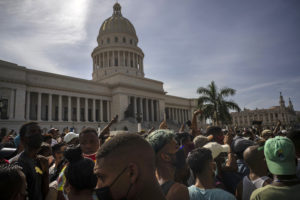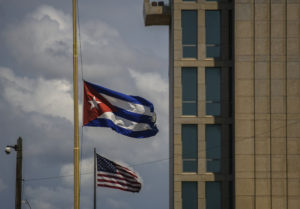On January 15, 2015, the Obama administration released sweeping regulations to implement its new Cuba policy. The regulations will go into effect on January 16, 2015. Below are some of the questions that WOLA has been asked most frequently. This list is not exhaustive and does not address all of the details of the new regulations. It does, however, cover the most significant measures and offers insight on how these regulations will make a difference for U.S. travelers to Cuba and for the Cuban people.
1. What authority does the President have to make these changes to our Cuba policy, and why do these regulations matter?
While only Congress can completely lift the embargo, U.S. law gives the President the authority to modify certain aspects of U.S. policy toward Cuba.[1] This authority was the basis for President Obama’s December 17th announcement of a change in U.S. policy toward Cuba; the policy changes are now being implemented via a series of regulations issued by the Treasury Department’s Office of Foreign Assets Control (OFAC) and the Commerce Department.
TRAVEL
2. What has changed about the types of travel permitted?
U.S. law specifically prohibits tourist travel to Cuba. However, certain categories of “purposeful” travel are permitted. These include academic research, student travel and non-student educational/cultural exchanges (usually referred to as “people-to-people” travel), journalistic activity, and family travel, among others.
While the Obama administration has not changed the number of categories of travel that are permitted, the definitions of some categories have been expanded; for example, under “humanitarian activities” category, microfinance projects with the new Cuban private sector are now authorized.
3. What’s a “general license,” and why does it matter that the Obama administration created one for all of the travel categories?
Travel to Cuba will now be easier due to relaxed licensing requirements. Travelers whose activities fall into one of the permitted travel categories are said to be “licensed” to travel to Cuba. There are two types of licenses: general and specific. The main difference between general and specific licenses is whether or not travelers need to seek approval from the U.S. government (specifically, OFAC) before traveling to Cuba. Travelers whose trips fall under certain travel categories do not need to get approval before traveling. They generally sign an affidavit certifying that their planned activities in Cuba meet the criteria for that particular type of trip.
For example, there is a general license available for academic research. As long as an academic has planned a full-time schedule of research in their area of expertise while they are in Cuba, and that research has a high likelihood of being publicly disseminated, they are able to travel to Cuba by just signing an affidavit certifying that they meet those requirements. They do not need to submit anything to OFAC in advance of the trip.
Prior to today, some types of trips—including people-to-people travel—required a specific license. This meant that travelers needed get approval from OFAC before going to Cuba. To obtain a specific license, would-be travelers needed to submit a detailed application to OFAC, which made decisions about whether or not to issue licenses on a case-by-case basis. Applicants were required to describe the type of activities that they planned to engage in and, in many cases, prove that they were qualified to carry out those activities.
The specific license process was meant to ensure that travelers weren’t abusing the travel categories by going on trips that didn’t fit the criteria, but in practice it was onerous, lengthy, and frustrating. (WOLA, which has been leading delegations to Cuba since 1995, was once denied a people-to-people license renewal not because our activities were not permitted, but apparently because we didn’t use specific language that OFAC wanted to see.) Many organizations specializing in people-to-people travel to Cuba were forced to dedicate a great deal of time and money (in the form of legal fees) to shepherd their applications through OFAC’s Kafkaesque process. Those costs were then passed on to travelers in the form of long delays and higher fees, making people-to-people travel prohibitively expensive for most Americans.
The new regulations eliminate some of these headaches by creating general licenses for all categories of travel to Cuba. This means that any organization or individual that meets the requirements of any of the categories will be able to go to Cuba without seeking prior approval from OFAC, although they will need to keep records relating to the trip for five years. Creating a general license for travel means that many more organizations will be able to offer people-to-people trips to Cuba, thereby putting travel to Cuba within reach of more Americans.
4. Can travelers go to Cuba on their own, or do they need to travel under the auspices of an organization or tour group?
It depends on the travel category. Some categories, such as family visits and professional research, can be carried out by individuals and don’t require an organizational affiliation.
On the other hand, the new regulations still require that people-to-people trips—by far the most popular way for Americans to travel to Cuba—occur under the auspices of a U.S. organization that “sponsors such exchanges to promote people-to-people contact.” This unfortunately means that most American travelers will still see Cuba via structured group tours; while many people-to-people trips are worthwhile, travelers will have less autonomy, and the trips are likely to remain on the expensive side.
5. Can travelers bring back Cuban goods?
U.S. travelers are now permitted to bring back $400 worth of Cuban goods, of which only $100 of which can be rum and tobacco. Previously, travelers were only allowed to bring back art and informational materials, such as books.
6. How will the logistics of traveling to Cuba change?
If the implementation of these regulations goes smoothly, traveling to Cuba is about to become significantly less complicated. Americans will be allowed to use their credit and debit cards in Cuba, eliminating the need to carry large amounts of cash into the country. Limits on the amount of money that Americans can spend in Cuba have also been lifted.
U.S. travelers will also have many more options when it comes to booking travel to Cuba. Previously, companies interested in providing travel-related services—such as flights and hotel bookings—were required to apply for and obtain a specific license from OFAC in order to do so. All flights between the United States and Cuba are currently charter flights that are arranged through these licensed travel service providers (TSPs). But there are only a handful of licensed TSPs, so charter flights are limited in number and expensive.
Fortunately, the new regulations have eliminated the need for companies to obtain this specific license; instead, a general license will allow any travel-related company (travel agencies, online booking sites, airlines, and more) to facilitate travel to Cuba without first seeking approval from OFAC. The regulations also no longer prohibit regularly scheduled commercial air service (that is, normal, non-charter flights) between the United States and Cuba. According to OFAC, the U.S. Department of Transportation will work to establish regularly scheduled routes. Once commercial flights between the United States and Cuba resume, Americans will be able to buy a ticket to Cuba directly from an airline, just like they would when visiting any other country.
Congress needs to take the next step and lift the embargo in order to truly normalize travel to Cuba. But taken together, all of these changes are a significant step forward in making travel to Cuba simple and accessible for all Americans.
TRADE
7. What has changed in terms of exports to Cuba?
Because of the U.S. embargo, there is a blanket ban on all exports to Cuba. However, the Commerce Department can issue licenses that grant exceptions and allow companies to export certain types of goods, such as food and medicine. The new regulations add new types of exceptions and revise some of the old exception policies. For example, U.S. companies are now authorized to export goods “intended to empower the nascent private sector by supporting private economic activity.” These goods might include building materials, tools, supplies, and equipment needed by Cuban entrepreneurs. This is a welcome step; many Cubans in the country’s private sector lack the material inputs needed to make their businesses a success. It is still not clear, however, how goods destined for the private sector will be handled on the Cuban side, since all exports to Cuba are currently managed by state-run import company Alimport. And it is not yet clear whether the definition of the private sector will include the newly emerging cooperatively-owned businesses in Cuba.
The regulations also allow for the export of communications-related items to Cuba, such as computers, phones, and software; previously, Americans were only allowed to donate these items. And a reinterpretation of the term “cash in advance” (meaning that Cuba must pay in advance for the U.S. agricultural goods that it imports) has modified the cash in advance restriction to make it easier for agricultural producers to export their goods to Cuba.
8. What kind of telecommunications activities are now allowed in Cuba?
The new regulations include a general license that authorizes companies to “establish mechanisms to provide commercial telecommunications services in Cuba or linking third countries and Cuba.”
This has the potential to be quite significant. Cuba’s telecommunications situation is dismal. The country has the worst internet penetration rate in the Western Hemisphere; it’s estimated that only 5 percent of Cubans having access to uncensored internet. Cuba’s lack of internet access hampers its economic growth and cuts its citizens off from the rest of the world. President Obama’s 2009 reforms to U.S.-Cuba policy included a series of measure meant to “authorize greater telecommunications links with Cuba.” While intended to be helpful, the 2009 measures did not have the desired effect; the confusing nature of the regulations and the licensing process deterred telecommunications firms from taking steps to connect with Cuba.
It’s still not clear how telecommunications firms will react to the new regulations and how long it will take for them to establish business relationships with Cuba. It’s also not clear how the Cuban government might respond to an influx of U.S. telecommunications companies offering their services. But this is a step in the right direction for Cubans that are eager to connect with the rest of the world.
9. Are there still limits on remittances to Cuba?
As of 2009, Cuban Americans may send unlimited remittances to their families in Cuba. The new regulations increase the limit on remittances sent by a non-Cuban American from $500 per quarter to $2000 per quarter. While advocates had encouraged the Obama administration to remove the limit entirely, increasing this limit will allow Americans to support their Cuban friends and family more substantially.
Ana Sorrentino is WOLA’s Program Officer for Cuba.


